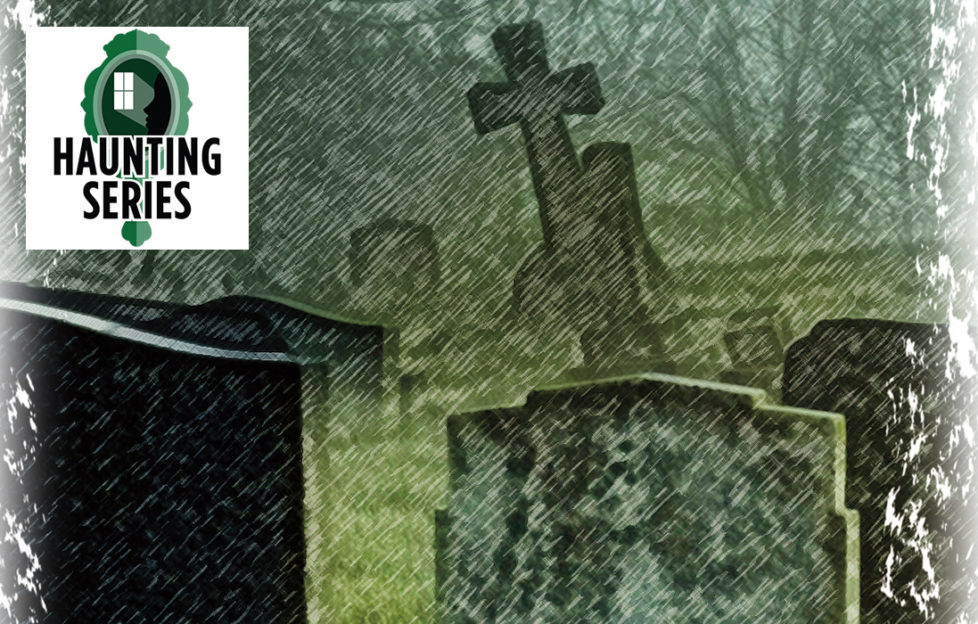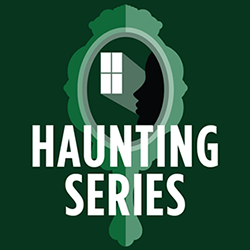The Perfect Location

WRITTEN BY ALISON CARTER
Ambitious director Freddie will stop at nothing to shoot his horror film… until he meets someone equally determined…
Freddie Richards had been a producer with NewReel Films for three years, and was confident that he’d made his mark and was on the way up.
He’d made a series of documentaries, plus a short film about the inner cities, but what he was really itching to get to work on was horror.
He sent a few emails, bought quite a few drinks, sent out feelers, but no joy. Until, finally, NewReel’s boss, Mike Edwards, emailed.
I’ve been given this script, Mike wrote. It’s the sort of thing that might interest you.
After a suitable pause – it was always good to be cool – Freddie headed in to the office.
“It’s a lovely little Victorian tale,” Mike explained. “Old-fashioned horror, more faces-at-the-window than Texas Chainsaw Massacre. I’m thinking dry ice; I’m thinking Julie Webber for the lead.”
Freddie’s heart sank. Webber was practically forty.
“Julie will play the unmarried vicar’s daughter,” Mike continued. “It’s a rural setting, aimed at the older cinema-goer.”
Freddie had imagined himself producing the next teen cult hit. He’d envisaged pretty young actresses on his arm at the première.
“Rocking horses, rocking with nobody there,” Mike was saying cheerfully, “you know.”
“Sounds… great,” Freddie said, trying to appear sincere.
He cheered up when the time came to hunt for locations. Marta, the location scout, sourced a couple of old churches and they set off to Berkshire, where Freddie shook his head irritably in front of some ancient pile.
It’s too nice… we’re channelling Psycho, not Midsomer Murders
“It’s far too… nice,” he complained. ”I think I mentioned, Marta darling, that we’re aiming at menacing here. We’re channelling Psycho, not Midsomer Murders.”
Marta bit her lip.
“I felt that good lighting could deal with that,” she said. “It’s got all the features. Look at the arches.”
Freddie rolled his eyes.
“Where next?” he said.
In a Surrey graveyard, he became even more impatient.
“It looks OK,” he said, surveying the crumbling granite and mossy paths, “but listen, Marta.”
They stood there for a minute, until Marta said, “I know Freddie, there’s a little traffic noise. But the sound guys say they can filter that out.”
Freddie looked at her.
“I don’t want fudges,” he said with what he felt was infinite patience. “I want perfect. There are how many churches in the UK? Do you think you could just find me a suitable church?”
Then Freddie had a stroke of luck. He knew a girl down in Sussex, someone he wanted to impress.
Harriet Brennan’s mum was senior in Universal Pictures, so it was a no-brainer to spend time with her, and he managed to get himself invited over to her parents’ place near Uckfield for the weekend.
On a country walk with the family, Freddie talked about his career for an hour or so. He was amusing, he felt.
“Our local church is interesting,” Harriet’s father said in a pause. “For centuries the village of Isfield was clustered around the church – you can see its ideal position here at the junction of the Ouse and the Uck – but then they built the railway station half a mile away, which wasn’t uncommon back then, and that meant the village declined.”
Freddie had stopped listening. He wasn’t into history, and wasn’t sure why old people were so keen on it. But then he saw the church.
It’s alone? Surrounded by nothing?
“It’s, like, totally alone?” he said. “Like, surrounded by nothing?”
“Yes,” Mr Brennan said. “The village effectively moved, with the passing of time, to join the railway, leaving St Margaret’s –”
“Good grief,” Freddie interrupted, “you can’t hear a single car! And look at all that ivy! I’d hardly need any set dressers! There’s even a massive, like, drive, for the trucks. Listen, Mr B, do you know the vicar or whatever?”
They did know the vicar – curate, actually – but at that point Harriet became rather unhelpful. It was almost as if she didn’t want him to bring a massive film crew to their backwater and put the place on the map.
It was almost as though she didn’t want to spend more time with him.
“It is a lovely church,” she said quietly, “in some ways.”
“It’s an awesome location,” Freddie exclaimed, staring up appreciatively at the crumbling gargoyles.
“But I’m just not convinced it’d… work out,” she protested. “For a film. There’s the issue of –”
“Trust me,” Freddie interrupted, taking her hand. “I do know what I’m doing, you know.”
Freddie talked the reluctant curate into loaning his church, though the curate was pretty uncool, too. He wasn’t even impressed when Freddie mentioned the fat facilities fee which NewReel could offer.
Freddie threw words around like restoration and organ fund, but the curate said something pointless about the place not being used for events.
“This is a bit different from an event,” Freddie said. “This is cinema.”
“Yes…” said the curate.
In the end, the bishop told the curate that the diocese needed the cash. So Freddie’s cast and crew rolled into Isfield one sunny morning.
Soon microphones were rigged, and the photography and lighting guys were taking measurements. All of a sudden, Freddie was aware that they’d all stopped moving, and were standing frowning at each other.
“Chop chop,” he called out. “We’ve got thirty shots to get in the can here.”
A cameraman rubbed his arms.
“It’s freezing in here. This draught on my neck is bitter, and in May!”
An hour later, much to Freddie’s annoyance, a camerawoman was found huddled in the catering van, shivering and sweaty, and he was obliged to let her go off sick. Then Phil, the lighting guy, claimed his equipment was suffering in damp conditions, and his bulbs kept blowing.
Freddie said Phil should do better checks before leaving home, and Phil scowled and retorted that he was a professional, and asked what Freddie knew about lighting.
“Well, a degree from film school, actually, Phil,” Freddie said.
They wrapped early that day, especially because Julie was complaining about a cough.
He cheered himself up by calling Harriet and arranging to meet her at a local gastropub. He liked Harriet, and she was good-looking, and her mum had definitely hinted about his future – he was pretty good at decoding subtext.
The Brennans owned a fabulous house with a pool, too. In the pub, he put an arm around Harriet, an idea blossoming in his mind.
Wouldn’t it be, like, an amazing tie-in for the movie if someone got married in St Margaret’s?
“This sounds so corny, but wouldn’t it be, like, an amazing tie-in for the movie if someone got married in St Margaret’s? Synched with the film’s release!”
“Married?” Harriet seemed taken aback. “Er, St Margaret’s doesn’t do weddings,” she said.
“Why not?”
Harriet turned pink. “It’s ridiculous, really. There are local stories that claim weddings sort of… go wrong. There’s always some disaster. People – New Agers – go on about ley lines around here, and bad vibrations.”
“Good grief!” Freddie said. “This is Sussex, not the back of beyond!”
The next day a tripod fell over and a lens got broken, and Freddie had to call the insurers. He was last in the church that evening, walking along the nave and reflecting how lightweight his team was, when he thought he heard a noise. It was something like the trundling of studio camera wheels.
He stopped walking to listen, and caught sight of movement in the side chapel – perhaps a curtain in a breeze, he thought. He turned to look. There was a figure, low down by the pulpit.
“Who’s there?” he said, intending to sound challenging, but his voice emerged as a thin croak. But the figure had vanished.
Freddie chuckled to himself. There had obviously been nobody there. Whatever it was he’d seen – a shifting shadow, a trick of the light, it had looked weirdly like a woman, and a woman seated. Except there wasn’t a chair anywhere near the pulpit.
He took a step closer to make sure, then decided to get back to his hotel. He backed to the door, trotted down the church path and jumped into his Lexus.
Driving along at sixty-five, he reflected that it had looked amazingly like a person, sharp points of the chin and nose illuminated by the faint light from the windows. The rest of her had been dimly lost in shadow. Like a woman. Watching.
The next morning Freddie’s schedule suffered another delay because precious Julie had apparently sprained her ankle in the church the evening before, and was having it strapped.
Some old lady from the church arrived – probably just desperate to get her first look at a film crew – and offered to show Freddie the St Margaret’s archive. He said no, but filming had basically ground to a halt, and he was bored, so he let her open up her dusty glass case.
“We’ve got quite a collection,” she said proudly. “Here are lists of church wardens, plus photographs.”
“Oh yeah?” Freddie muttered. It was getting cold again, and he looked around for his Parka.
“I love the old photos,” she said. “People had to stand still for several minutes, you know, which is why they look miserable.”
“Thank goodness for digital,” Freddie said vaguely. “Look, is the heating on?”
This is Edwina Hammand, she was in charge of flowers in 1864…
“This is Edwina Hammand,” the woman interrupted, “with her family. She was in charge of flowers, 1864 to 1885. So formal, isn’t it! Her name’s there but look, her face is blurred.”
“Silly woman must have moved.” At that moment Freddie saw Julie, limping in on crutches. “Got to go,” he said.
Julie’s injury made life difficult, and far too many of Freddie’s shots went awry – the rushes looked washed out on his monitor, or Phil’s lighting never seemed to be able to bring the set to life, or people kept breaking things.
The insurers called to say that they needed to “review” the location due to an unusually high number of incidents. On day three, everyone left for lunch as soon as he called “cut!”, all of them smelling the caterer’s famous onion soup. Freddie followed quickly, not sure he wanted to be last in the church.
Something moved into his upper left field of vision just as he reached the back row. He glanced up at the gallery with a faint sense of foreboding.
She was there again, the figure, still as ice, her furious grey face looking right at him, a woman’s face but hideous, hollow, shadowy and pale, the eyes deep-set and blank, the ghostly hair seeming to mingle with the cold, damp walls of the church.
She – it – was surely sitting on the front row of the gallery, her skeletal hand draped over the railing, leaning down towards him, as if she was looking right into his soul…
Freddie gasped and ran outdoors, his legs shaking uncontrollably, a sob rising in his chest.
There was no such thing as ghosts. Freddie had a degree, practically a scientific degree, and he knew the supernatural was rubbish. But he was beginning to hate this film.
He wondered if he needed medication – the strain of leading a major project must be getting to him.
They took ages over lunch. It was quite obvious they were delaying getting back to work. Freddie wanted someone just to walk in with, but he didn’t have the energy to order anybody to do it. They didn’t seem to like him all that much, despite his dedication. Harriet had turned down the offer of another dinner, too, but he’d actually seen her hobnobbing with Phil!
Then the church lady ambled up the drive, this time with another old biddy.
“Flo’s here to put up parish notices,” lady number one said cheerfully.
“I’ll come in with you, actually,” Freddie said.
Flo was an irritatingly chatty old bird, desperate to expand on her friend’s local history lesson.
Family legend has it that she was a grumpy so-and-so
“The blurry face belongs to my… was it my great-great or my great-great-great granny, Noreen?” she said to her pal. “Family legend has it that she was a grumpy so-and-so. My granny often talked about ‘Grandma Edwina’.
“She told me she remembers that very picture being taken.” The biddy prodded a finger at the glass. “It was when she was about eight, right here in the church. A professional photographer talked the curate into a session. It was all the rage, even that far back. Anyway, we must get on.”
Freddie didn’t want to talk about photographs, but equally he didn’t really want to be alone.
“So, she got blurred?” he said. He hated Granny Edwina already.
“My granny is so funny about it!” Flo said. “Edwina was angry that they made her sit for it. ‘It’ll take away our souls!’ she said! She was in a bath chair by then, apparently – retired from being a warden – and I suppose her family wouldn’t let her off! Her son tried to persuade her to keep still, and she got more and more annoyed. This,” Flo pointed at the case again, “is the result.”
Freddie found himself staring at the picture. He’d hadn’t noticed the arms of a wheelchair, peeping out from the folds of her thick, heavy black dress.
The sound of wheels…
“I’ve got to just, er, go and see someone about the…” Freddie mumbled distractedly.
He pushed open a side door and crossed the graveyard quickly, wondering why he’d not headed for the front, where the crew was. It was very cold back here, and so dark.
Jumping over grave after grave, he came up against a high, moss-covered wall, with no gate that he could see, no escape. It was deathly, bleakly silent – traffic-free, endless, cold silence.
And then came the noise. It was the bump and trundle of wheels, iron wheels on stone, on grass, on stone again. It was behind him and he knew that, in the end, he was going to have to turn round.
Less than two feet away from him, hunched over in her chair, there she was – a frightful, eager glint in her sunken eyes, and a milky, bony hand reaching out for him.
Freddie woke up on a bench in the catering van. Sunshine poured through the window. Harriet and Phil stood over him.
“Freddie,” Harriet said, “I’m so sorry. I think you’ve come up against our Edwina Hammand. I should have mentioned her. But you were so keen!
I suppose we have to assume that she is dead against photography
“The local stories – of wedding photographers losing cameras, pictures coming out spoiled, fights during the ceremonies, freezing temperatures, we thought they were just… superstition. But I suppose we have to assume that she is dead against photography, always was and always will be.”
Phil giggled. “Dead against, that’s funny.” Harriet dug him in the ribs. “It’s kind of ironic,” Phil went on, “that here we are making a horror movie, and –”
“Just shut up, Phil,” Freddie snapped, sitting up. “Shut up.”
The movie was shelved; it was way over budget already, especially the insurance spend. Freddie asked Mike for an office role, saying that production wasn’t for him.
He never returned to Isfield; in fact he avoided Sussex altogether. It was a shame, Harriet said, because she’d have loved him to attend her wedding to Phil, which was held nearby at Little Horsted church. She called after the honeymoon to see how Freddie was.
“The curate’s added a line to the St Margaret’s website,” she said. “He’s put ‘No Photography’.”
 Read our other Haunting Series stories…
Read our other Haunting Series stories…




